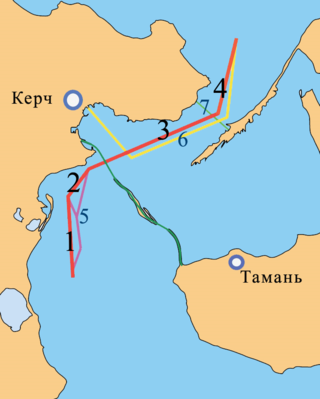Related Research Articles

Kerch, also known as Keriç or Kerich, is a city of regional significance on the Kerch Peninsula in the east of Crimea. It has a population of 147,033 .

The Uluburun Shipwreck is a Late Bronze Age shipwreck dated to the late 14th century BC, discovered close to the east shore of Uluburun, Turkey, in the Mediterranean Sea. The shipwreck was discovered in the summer of 1982 by Mehmed Çakir, a local sponge diver from Yalıkavak, a village near Bodrum.

The Nilotic languages are a group of related languages spoken across a wide area between South Sudan and Tanzania by the Nilotic peoples.
The Western Nilotic languages are one of the three primary branches of the Nilotic languages, along with the Eastern Nilotic languages and Southern Nilotic languages; Themselves belonging to the Eastern Sudanic subfamily of Nilo-Saharan. The about 22 Western Nilotic languages are spoken in an area ranging from southwestern Ethiopia and South Sudan via northeastern Democratic Republic of the Congo and northern Uganda to southwestern Kenya.

The Crimean Mountains or Yayla Mountains /jaɪːlə/, /jeɪːlæ/ are a range of mountains running parallel to the south-eastern coast of Crimea, between about 8–13 kilometers from the sea. Toward the west, the mountains drop steeply to the Black Sea, and to the east, they change slowly into a steppe landscape.

The Burun are a Luo Nilotic ethnic group from South Sudan. They live in and around the Upper Nile Valley in the eastern part of Upper Nile State. They speak Burun, a Luo Nilotic language. This ethnic group numbers about 8,000 persons, according to 2008 Sudan population census. Burun people inhabited the areas present of Dajo, Pacime, Waldese and Kigile in Upper Nile State.
Jumjum or Mabaan is an ethnic group in South Sudan. Most of its members are Muslims. The number of persons in this group is at about 92,000. They speak Mabaan, a Luo Nilotic language. They live in the Upper Nile.
Qızılburun is a village and municipality in the Hajigabul Rayon of Azerbaijan. It has a population of 1,034.
Yunusari is a Local Government Area in Yobe State, Nigeria. It has its headquarters in the town of Kanamma in the north-east of the area on the Burun Gana River at 13°06′15″N12°04′20″E. It shares a border in the north with The Republic of Niger.
Burun may refer to:

Gosaibaganer Bhoot is a Bengali comedy-fantasy film directed by Nitish Roy, based on a novel by Bengali writer Shirshendu Mukhopadhyay. The music/lyrics was composed by Bengali brand Chandrabindoo.
The Burun languages are a branch of the Nilotic languages. They include:
Southern Burun is a Western Nilotic language of Sudan. It is a dialect continuum with Burun proper, Mabaan/Ulu, and Jumjum.
Burun is a village in Shivanat Rural District, Afshar District, Khodabandeh County, Zanjan Province, Iran. At the 2006 census, its population was 342, in 68 families.
Qarah Burun is a village in Bozkosh Rural District, in the Central District of Ahar County, East Azerbaijan Province, Iran. At the 2006 census, its population was 40, in 8 families.
Burun Daraq is a village in Sina Rural District, in the Central District of Varzaqan County, East Azerbaijan Province, Iran. At the 2006 census, its population was 47, in 7 families.
Potami or Potamoi was a fortified port on the coast of the northeastern part of ancient Paphlagonia. According to Arrian, it was 150 stadia to the northeast of Stephane, but according to others only 120.
Mandane was a town on the coast of ancient Cilicia, between Celenderis, and Cape Pisidium or Posidium, from which it was only 7 stadia distant. William Smith conjectured it to be the same place as the Myanda or Mysanda mentioned by Pliny the Elder; and if so, it must also be identical with the town of Myus (Μυούς) mentioned in the Periplus of Pseudo-Scylax between Nagidus and Celenderis. Modern scholarship does not accept the identity.

Kerch Seaport Komysh-Burun is a seaport in the Arshyntseve district, in the industrial zone of Kerch, which specializes in transshipment of ferroalloys, coal, ilmenite, manganese ores, coke, and general cargo.
References
- 1 2 3 Burun at Ethnologue (27th ed., 2024)
